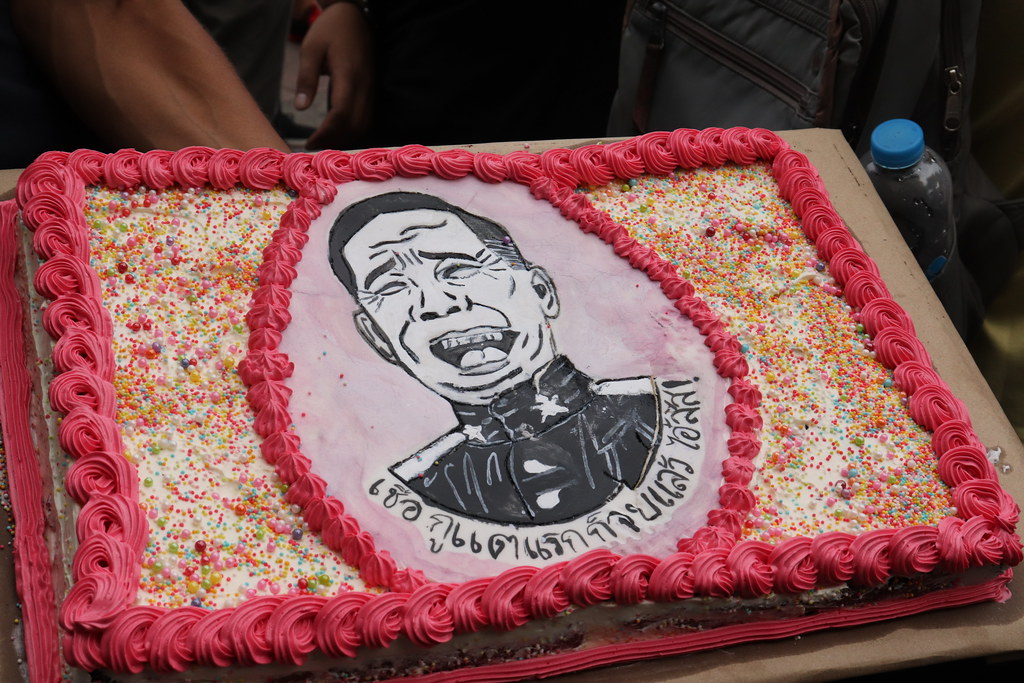15th July was marked by a celebration of the 123th anniversary of the birth of Field Marshal Plaek Phibunsongkhram, a leader of the People’s Party which instigated the 1932 Siamese Democratic Revolution. Despite his later transformation into a fascist, activists urged the new generation to learn from the successes and mistakes of the revolution.

Demonstrators were celebrating Plaek's birthday with a cake.
Around 30-50 people attended the event at the Democracy Monument, watched over by around the same number of uniformed and plainclothes police. A police officer had warned demonstrators to observe measures to avoid Covid-19 infection.
The Democracy Restoration Group, an activist group that organized the event, hosted an on-site dinner of phat Thai (literally ‘Thai stir-fry’), a noodle dish which was allegedly invented as a Thai version of Chinese noodles by Phibun’s nationalist government. They also had a cake with Phibun’s face on it.

Demonstrators were chanting and raising phat Thai.
Participants sang Happy Birthday and chanted “Dictatorship shall fall, long live phat Thai”, a pun in Thai on “Dictatorship shall fall, long live democracy”. They then danced the ramwong, a folk dance patronized by Phibun to counter the influence of western dances like the waltz and foxtrot.
Anon Nampa, a human rights lawyer and one of the organizers, said that the entertainment was to commemorate the good legacy of the days of the People’s Party. In the past 4-5 years, a growing number of attempts have been made to annihilate the legacy of the Party through narrative changes and the physical destruction of monuments.

Anon Nampa
Conservative historians have tried to label the People’s Party as premature or overly ambitious for daring to overthrow the absolute monarchy. Symbols of the People’s Party have been removed, like the plaque in the Royal Plaza commemorating the proclamation of the first constitution which was replaced with a royalist plaque, and military sites named after People’s Party members have been renamed after the late King Rama IX and his Queen.
Anon said that Phibun’s name was removed from a learning centre in Chiang Rai province. His statue at the National Defence College of Thailand was also removed. The Constitution Defense Monument at Laksi which marked the triumph of the People’s Party government against the royalist Boworadet rebellion in 1933 was also removed.

A wide view from the commemoration venue.
Anon underlined that this commemoration of Phibun and the People’s Party was held to mark ordinary people, not to worship nobility or the elite. The new generations must learn the successes, failures and mistakes of the People’s Party and its leaders.
Phibun, a member of the military wing of the People’s Party, was first elected Prime Minister after the resignation of Phraya Phahonphonphayuhasena in 1938 and was responsible for a modernization campaign which included a series of cultural mandates aiming to ‘civilize’ Thai culture. The country’s name was changed from “Siam” to “Thailand”.

Demonstrators were practicing ramwong at the event.
Phibun’s first term in office lasted from 1938 to 1944 when he allied the country with Japan in the Second World War. He returned to power after a coup in 1947 when he aligned Thailand with anti-communism in the Cold War, entered the Korean War, and attempted to transform Thailand into a liberal democracy. He was overthrown in 1957 and went into exile in Japan. To date, he is the longest serving Prime Minister of Thailand.
Phibun’s politics oscillated between democratic revolution and fascism, making his political background controversial. However, he introduced many features that transformed Thailand, like increasing women’s access to education, establishing development agencies in the bureaucracy, and organizing ‘Hyde Park’ public discussions for people to express themselves. (Source: BBC Thai)

A cake with Plaek's face.
Phi, one of the speakers at the commemoration, said Phibun’s administration contributed many things to Thailand economically and culturally. The revolution that transformed Thailand from an absolute monarchy to a constitutional monarchy did not put citizens at a disadvantage as the more the system was connected to the people, the more benefits the people would get.
Prachatai English is an independent, non-profit news outlet committed to covering underreported issues in Thailand, especially about democratization and human rights, despite pressure from the authorities. Your support will ensure that we stay a professional media source and be able to meet the challenges and deliver in-depth reporting.
• Simple steps to support Prachatai English
1. Bank transfer to account “โครงการหนังสือพิมพ์อินเทอร์เน็ต ประชาไท” or “Prachatai Online Newspaper” 091-0-21689-4, Krungthai Bank
2. Or, Transfer money via Paypal, to e-mail address: [email protected], please leave a comment on the transaction as “For Prachatai English”
